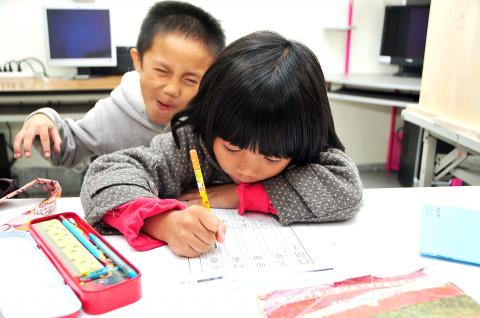Taipei is to become the nation’s first city to abolish a rule observed by elementary schools since 1975 that asks students to work on school assignments during their summer and winter vacations.
The Taipei Department of Education yesterday announced that it had abolished a set of guidelines covering assignments that elementary schools give pupils before they go on summer and winter vacations.
Starting next year, pupils at elementary schools across the city are not to have assignments during summer and winter vaction, the department said.

Photo: Hua Meng-ching, Taipei Times
Department Commissioner Tang Chih-min (湯志民) said the cancelation of the assignments would help to create a “student-oriented” learning environment, thereby helping pupils to cultivate independent thinking.
Citing examples of assignments elementary schools typically made students do during winter and summer vacations, which included “finish five books and write down your thoughts,” “help your mother with chores” and “write four pages of calligraphy,” Tang said that these types of tasks had not helped pupils develop independent thinking.
Taipei Mayor Ko Wen-je (柯文哲) touted the policy on Facebook.
Citing the adage “You are limited only by your imagination,” Ko said the policy would allow children to decide what they want to learn about and called on parents to encourage children to think about what they want to do during vacations.
“Taiwan has a very passive education system. Children are told what to do and what not to do until their ability to learn is amputated. The nation demanding that children with different aptitudes work on the same assignment is rather strange,” Ko said.
Netizens have responded favorably to the announcement.
A Facebook user named Alice Yu said: “Parents are happy because they no longer have to do winter and summer assignments for their kids.”
Another user, Liu Pei-yu (劉佩妤), recommended that parents encourage their children to use the Internet to search for information on tourist destinations and Taiwanese cuisine and guide them through trips during vacations, adding that parents can give children an allowance as a reward for their efforts.

Conflict with Taiwan could leave China with “massive economic disruption, catastrophic military losses, significant social unrest, and devastating sanctions,” a US think tank said in a report released on Monday. The German Marshall Fund released a report titled If China Attacks Taiwan: The Consequences for China of “Minor Conflict” and “Major War” Scenarios. The report details the “massive” economic, military, social and international costs to China in the event of a minor conflict or major war with Taiwan, estimating that the Chinese People’s Liberation Army (PLA) could sustain losses of more than half of its active-duty ground forces, including 100,000 troops. Understanding Chinese

The Ministry of Foreign Affairs (MOFA) yesterday said it is closely monitoring developments in Venezuela, and would continue to cooperate with democratic allies and work together for regional and global security, stability, and prosperity. The remarks came after the US on Saturday launched a series of airstrikes in Venezuela and kidnapped Venezuelan President Nicolas Maduro, who was later flown to New York along with his wife. The pair face US charges related to drug trafficking and alleged cooperation with gangs designated as terrorist organizations. Maduro has denied the allegations. The ministry said that it is closely monitoring the political and economic situation

UNRELENTING: China attempted cyberattacks on Taiwan’s critical infrastructure 2.63 million times per day last year, up from 1.23 million in 2023, the NSB said China’s cyberarmy has long engaged in cyberattacks against Taiwan’s critical infrastructure, employing diverse and evolving tactics, the National Security Bureau (NSB) said yesterday, adding that cyberattacks on critical energy infrastructure last year increased 10-fold compared with the previous year. The NSB yesterday released a report titled Analysis on China’s Cyber Threats to Taiwan’s Critical Infrastructure in 2025, outlining the number of cyberattacks, major tactics and hacker groups. Taiwan’s national intelligence community identified a large number of cybersecurity incidents last year, the bureau said in a statement. China’s cyberarmy last year launched an average of 2.63 million intrusion attempts per day targeting Taiwan’s critical

AGING: As of last month, people aged 65 or older accounted for 20.06 percent of the total population and the number of couples who got married fell by 18,685 from 2024 Taiwan has surpassed South Korea as the country least willing to have children, with an annual crude birthrate of 4.62 per 1,000 people, Ministry of the Interior data showed yesterday. The nation was previously ranked the second-lowest country in terms of total fertility rate, or the average number of children a woman has in her lifetime. However, South Korea’s fertility rate began to recover from 2023, with total fertility rate rising from 0.72 and estimated to reach 0.82 to 0.85 by last year, and the crude birthrate projected at 6.7 per 1,000 people. Japan’s crude birthrate was projected to fall below six,